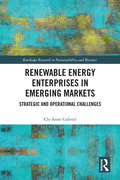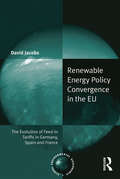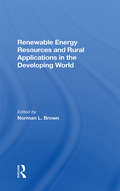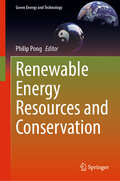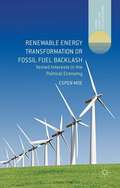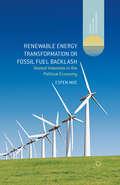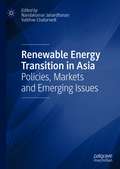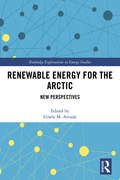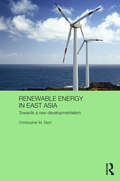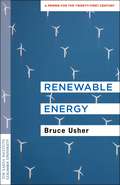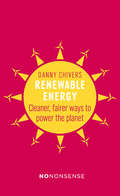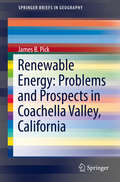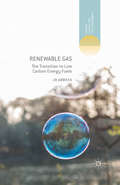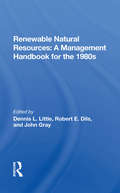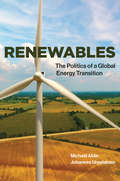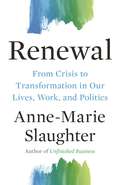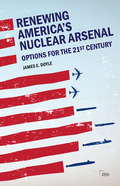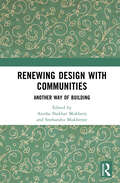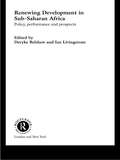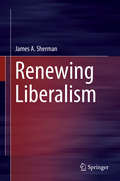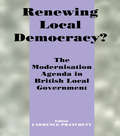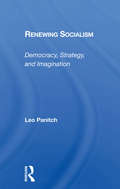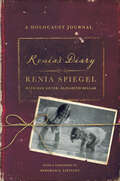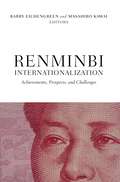- Table View
- List View
Renewable Energy Enterprises in Emerging Markets: Strategic and Operational Challenges (Routledge Research in Sustainability and Business)
by Cle-Anne GabrielThis book highlights the challenges faced by renewable energy enterprises (REEs) in emerging markets, by reflecting on the enterprises&’ own stories and experiences. Research into REEs has focused largely on successful businesses and business models, and developed markets. With significant opportunities for renewable energy enterprise in emerging markets, this book presents a unique business-level perspective. It highlights the key barriers and outlines the strategic and operational solutions for success articulated by the entrepreneurs themselves. The research draws on interviews with entrepreneurs in twenty-eight emerging markets, including Barbados, Cambodia, Chile, Ghana, Indonesia, India, Kenya, South Africa and Uganda. The book concludes by summarising the key solutions for success and illustrating how successful REEs put them into practice. This book will be of great interest to students and scholars of renewable energy, sustainable business and the sustainability agenda in emerging markets.
Renewable Energy Policy Convergence in the EU: The Evolution of Feed-in Tariffs in Germany, Spain and France (Global Environmental Governance)
by David JacobsThis book examines the coordination of renewable energy policies in the European Union using an innovative theoretical approach to explain national policy making. David Jacobs asks, why are national support instruments for electricity from renewable energy sources converging, even though the harmonisation of these frameworks at the European level has failed? Which causal mechanisms lead to cross-national policy similarities? And what are the implications for policy coordination in the EU? The author traces the evolution of feed-in tariffs - the most successful and most widely used support mechanism for renewable electricity - in Germany, Spain and France. He reveals increasing cross-national policy similarities in feed-in tariff design - despite the failure of harmonizing instruments at the European level. He explains these increasing policy similarities by applying policy convergence theory. Policy convergence can occur voluntarily, based on transnational communication, regulatory competition and technological innovations and these findings have important implications for European policy steering. The key to this book is the interrelation of an innovative theoretical concept (coordination of policies in the international arena via voluntary cooperation) with a very topical empirical research focus - the promotion of renewable energies in the EU. It will be essential reading for scholars and students of environmental policy, comparative politics and European studies.
Renewable Energy Resources And Rural Applications In The Developing World
by Norman L. BrownThe energy situation in developing countries is desperate.Because these countries are primarily dependent on fossil fuels--chiefly oil--for industrial growth, they have been hard hit by oil price increases. Further, in the rural areas, where most of the population lives, there are limited supplies of increasingly expensive diesel fuel or kerosene. Noncormzercial energy sources such as firewood, dung, and agriouZtural residues are generally used in rural areas, but under the pressure of growing populations the forests are disappearing. This is resulting in a critical shortage of firewood for cooking and heating, as well as in the destruction of the environment. In addition, when dung and agricultural residues are burned, valuable fertilizers are destroyed. Thus, the rural areas--the sources of food and fiber--face a particularly alarming situation.
Renewable Energy Resources and Conservation (Green Energy and Technology)
by Philip PongThis book offers a comprehensive overview of state-of-the-art research and development in diverse areas of renewable energy, including renewable energy storage, conservation, solar, wind, biomass, nuclear, geothermal, and renewable energy systems. It is a valuable resource for anyone interested in gaining insight into the latest advancements in renewable energy technologies and their applications. The book chapters present selected high-quality research from the 8th International Conference on Renewable Energy and Conservation (ICREC 2023) that analyze the latest trends and present case studies. Renewable Energy Resources and Conservation offers researchers, practitioners, professionals, and scientists working in renewable energy engineering a host of authoritative ideas and insights into renewable energy grid infrastructures, engineering design methods, technologies, and best practices to address industrial challenges.
Renewable Energy Transformation or Fossil Fuel Backlash: Vested Interests in the Political Economy (Energy, Climate and the Environment)
by Espen MoeRenewable Energy Transformation or Fossil Fuel Backlash.
Renewable Energy Transformation or Fossil Fuel Backlash: Vested Interests in the Political Economy (Energy, Climate and the Environment)
by Espen MoeRenewable energy is rising within an energy system dominated by powerful vested energy interests in fossil fuels, nuclear and electric utilities. Analyzing renewables in six very different countries, the author argues that it is the extent to which states have controlled these vested interests that determines the success or failure of renewables.
Renewable Energy Transition in Asia: Policies, Markets and Emerging Issues
by Nandakumar Janardhanan Vaibhav ChaturvediThis book covers critical debates on policies, markets and emerging issues that shape renewable energy transition in the Asian region, which is fast becoming an epicenter of the global energy consumption. The chapters focus on domestic policies, geopolitics, technology landscape and governance structure pertaining to the development of renewable energy in different Asian countries ranging from China to the Middle East. The book presents an insightful view of the pace and magnitude of the energy transition. It presents critical steps countries are taking to promote affordable and clean energy (SDG 7) as well as strengthening climate mitigation actions (SDG 13). In addition, this book introduces the concept of co-innovation---a collaborative and iterative approach to jointly innovate, manufacture and scale up low-carbon technologies---and its role in promoting energy transition in Asia. Chapter 8 (Renewable energy deployment to stimulate energy transition in the Gulf Cooperation Council) is available open access under a Creative Commons Attribution 4.0 International License via link.springer.com.
Renewable Energy for the Arctic: New Perspectives (Routledge Explorations in Energy Studies)
by Gisele ArrudaThis book explores various facets of the transition to renewable energy in the Arctic region. It critically examines the adverse effects of fossil fuel extraction and use, environmental and social impacts of climate change, and the possibility of a low carbon energy system through innovation and technology. Drawing together a diverse range of contributors and considering a range of new energy sources, this volume also looks at the scale of the transition challenges in the Arctic energy production and use, the necessary flexibility to balance energy demand and supply, the need of a more integrated energy infrastructure, and the new energy business models, health and safety, and quality standards for the region. Finally, it examines the transit and influence between Arctic and non-Arctic countries, in terms of growth, partnerships and new dynamics of a transitioning process to a sustainable energy system. Focusing on specific case studies that represent the most relevant energy projects in the region, this book will be of great interest to students and scholars of energy policy and transitions, climate change, global business and sustainable development.
Renewable Energy in East Asia: Towards a New Developmentalism (Routledge Contemporary Asia Series)
by Christopher M. DentEnergy is crucial to the functioning of any human society and central to understanding East Asia’s ‘economic miracle’. The region’s rapid development over the last few decades has been inherently energy-intensive and the impact on global energy security, climate change and the twenty-first-century global system generally is now very significant and will become more so over foreseeable years and decades to come. The region is already the world’s largest energy consumer and greenhouse gas emitter, so establishing cleaner energy systems in East Asia is both a regional and global challenge, and renewable energy has a critically important part to play in meeting it. This book presents a comprehensive study of renewable energy development in East Asia. It begins by examining renewable energy development in global and historic contexts, and situates East Asia’s position in the recent worldwide expansion of renewables. This same approach is applied on sector-specific chapter studies on wind, solar, hydropower, geothermal, ocean (wave and tidal) and bioenergy, and to general trends in renewable energy policy. Governments play a critical role in promoting renewables and their contribution to tackling climate change and other environmental challenges. Christopher M. Dent argues this is particularly relevant to East Asia, where state capacity practice has been increasingly allied to ecological modernisation thinking to form what he calls ‘new developmentalism’, the principal foundation on which renewables have developed in the region as well as how East Asia’s low carbon development is being generally promoted. Renewable Energy in East Asia will be of huge interest to students and scholars of Asian studies, economics, political economy, energy studies, business, development, international relations and environmental studies. It will also appeal to researchers working on the subject matter in government, business, international organisations, think tanks and civil society organisations.
Renewable Energy: A Primer for the Twenty-First Century (Columbia University Earth Institute Sustainability Primers)
by Professor Bruce UsherFrom wood to coal to oil and gas, the sources of energy on which civilization depends have always changed as technology advances. Now renewables are overtaking fossil fuels, with wind and solar energy becoming cheaper and more competitive every year. Growth in renewable energy will further accelerate as electric vehicles become less expensive than traditional automobiles. Understanding the implications of the energy transition will prepare us for the many changes ahead.This book is a primer for readers of all levels on the coming energy transition and its global consequences. Bruce Usher provides a concise yet comprehensive explanation for the extraordinary growth in wind and solar energy; the trajectory of the transition from fossil fuels to renewables; and the implications for industries, countries, and the climate. Written in a straightforward style with easy-to-understand visual aids, the book illuminates the strengths and weaknesses of renewable energy based on business fundamentals and analysis of the economic forces that have given renewables a tailwind. Usher dissects the winners and losers, illustrating how governments and businesses with a far-sighted approach will reap long-term benefits while others will trail behind. Alongside the business and finance case for renewable energy, he provides a timely illustration of the threat of catastrophic climate change and the perils of delay. A short and powerful guide to our energy present and future, this book makes it clear that, from both economic and environmental perspectives, there is no time to lose.
Renewable Energy: Cleaner, fairer ways to power the planet (No-Nonsense Guides #35)
by Danny ChiversFew people doubt the threat of climate change and the urgent need to conquer fossil fuel addiction. But can renewable sources of energy ever be sufficient to provide modern societies with a decent quality of life? This book is clear. They can. And it outlines the strategies to break the barriers to a 100% renewable world. Danny Chivers presents a compelling introduction to renewable technologies for non-technical readers (solar, wind, hydro, geothermal and ambient heat, wave and tidal, fuel crops, and energy from waste) and a roadmap to powering the world, not just sustainably, but democratically.
Renewable Energy: Problems and Prospects in Coachella Valley, California (SpringerBriefs in Geography)
by James B. PickThe book analyzes the problems and potential of renewable energy development for the Coachella Valley of California and provides a useful case study for renewable energy feasibility assessments for other areas. A conceptual model, Integrated Policy Assessment Theory for Renewable Energy, is given and justified for renewable energy development in the Valley. Further, Central Place Theory, well known in urban geography, is discussed and it is seen to be very relevant to the understanding the Coachella Valley’s city sizes and renewable energy markets, compared to the greater Los Angeles region. The book’s research methods include geospatial mapping and analysis and interviews leaders in small innovative firms, government agencies, and nonprofits. The many findings of the book include evaluation of how the Valley’s socioeconomic and transportation features influence renewable energy development, the scope of markets for solar and wind energy in the Valley, spatial confluences of renewable energy facilities with other features, and the future potential of ground-source heat pumps. Benchmark comparison of the Coachella Valley is done with two leading wind and solar regions elsewhere in the country, to assess the Valley’s evolution and opportunities in renewable energy. The book concludes by evaluating the prospects and problems for the growth of renewable entrepreneurship, manufacturing, assembly, and operations in Coachella Valley. This leads to policy recommendations grounded in the book’s research findings, which are intended for use by governments, businesses, and nonprofits. The hope is that many of the developmental experiences from the Coachella Valley will be helpful not only within the Valley but to other communities nationwide and worldwide.
Renewable Gas: The Transition to Low Carbon Energy Fuels (Energy, Climate and the Environment)
by Jo AbbessThe author looks at the prospects for a transition from natural gas to low carbon gas, which could take several decades, and at how this will depend on the evolution of the fossil fuel industry. She investigates the technologies and energy systems for making the best use of renewable gas resources.
Renewable Natural Resources: A Management Handbook For The Eighties
by Dennis Little Robert E. Dils John John GrayEnormous in scope, this book presents in comprehensive and logical form the sum of our national knowledge about renewable energy resources. It deals with these resources in terms of opportunities and dangers, in terms of current availability and possible expansion, in terms of how natural resources relate to human resources and needs, and in terms of their replacement potential for nonrenewable resources such as fossil fuels. It also puts domestic resources and needs into the context of international needs, supplies, and policies, emphasizing the issues facing an interdependent world and the urgent requirements perceived by countries less endowed than the United States. This is a handbook for the concerned citizen as well as for resource managers and policymakers at local, regional, and national levels. The analyses it contains underscore the fact that there are no easy answers: everything is part of an interlocking system, and every decision will affect multiple aspects of our daily lives and indeed our very existence. The authors emphasize the crucial importance of early planning, balanced management, and timely decisions, while suggesting that something more is required—a new ideology and a new educational approach.
Renewables: The Politics of a Global Energy Transition (The\mit Press Ser.)
by Johannes Urpelainen Michael AklinA comprehensive political analysis of the rapid growth in renewable wind and solar power, mapping an energy transition through theory, case studies, and policy.Wind and solar are the most dynamic components of the global power sector. How did this happen? After the 1973 oil crisis, the limitations of an energy system based on fossil fuels created an urgent need to experiment with alternatives, and some pioneering governments reaped political gains by investing heavily in alternative energy such as wind or solar power. Public policy enabled growth over time, and economies of scale brought down costs dramatically. In this book, Michaël Aklin and Johannes Urpelainen offer a comprehensive political analysis of the rapid growth in renewable wind and solar power, mapping an energy transition through theory, case studies, and policy analysis.Aklin and Urpelainen argue that, because the fossil fuel energy system and political support for it are so entrenched, only an external shock—an abrupt rise in oil prices, or a nuclear power accident, for example—allows renewable energy to grow. They analyze the key factors that enable renewable energy to withstand political backlash, andt they draw on this analyisis to explain and predict the development of renewable energy in different countries over time. They examine the pioneering efforts in the United States, Germany, and Denmark after the 1973 oil crisis and other shocks; explain why the United States surrendered its leadership role in renewable energy; and trace the recent rapid growth of modern renewables in electricity generation, describing, among other things, the return of wind and solar to the United States. Finally, they apply the lessons of their analysis to contemporary energy policy issues.
Renewal: From Crisis to Transformation in Our Lives, Work, and Politics
by Anne-Marie SlaughterFrom the acclaimed author of Unfinished Business, a story of crisis and change that can help us find renewed honesty and purpose in our personal and political livesLike much of the world, America is deeply divided over identity, equality, and history. Renewal is Anne-Marie Slaughter’s candid and deeply personal account of how her own odyssey opened the door to an important new understanding of how we as individuals, organizations, and nations can move backward and forward at the same time, facing the past and embracing a new future.Weaving together personal stories and reflections with insights from the latest research in the social sciences, Slaughter recounts a difficult time of self‐examination and growth in the wake of a crisis that changed the way she lives, leads, and learns. She connects her experience to our national crisis of identity and values as the country looks into a four-hundred-year-old mirror and tries to confront and accept its full reflection. The promise of the Declaration of Independence has been hollow for so many for so long. That reckoning is the necessary first step toward renewal. The lessons here are not just for America. Slaughter shows how renewal is possible for anyone who is willing to see themselves with new eyes and embrace radical honesty, risk, resilience, interdependence, grace, and vision.Part personal journey, part manifesto, Renewal offers hope tempered by honesty and is essential reading for citizens, leaders, and the change makers of tomorrow.
Renewing America’s Nuclear Arsenal: Options for the 21st century (Adelphi series)
by James E. DoyleIn the next few years the US government will make decisions regarding the renewal of its triad of air-, land- and sea-based nuclear weapons that will have huge implications for the security of the country and its allies, its public finances, and the salience of nuclear weapons in global politics. Current plans provide for spending an estimated US$1 trillion over 30 years to modernise or replace the full triad. The purpose of this book is to demonstrate viable alternatives to the current US plan to modernise or replace its full triad of air-, land- and sea-based nuclear weapons. These alternatives would allow the US to maintain deterrence at a lower cost, thereby freeing up funds to ease pressing shortfalls in spending on conventional procurement and nuclear security. Moreover, these alternative structures – which propose a reduction in the size and shape of the US arsenal – offer distinct advantages over the existing plan with regard to maintaining strategic stability vis-à-vis Russia and China; upholding existing arms-control treaties, in particular New START and the INF Treaty; and boosting the security of US nuclear forces and supporting the global non-proliferation regime, including the NPT. They would also endow the US with a nuclear force better suited to the strategic environment of the twenty-first century and mark an advance on the existing triad with regard to supporting conventional military operations.
Renewing Design with Communities: Another Way of Building
by Anisha Shekhar Mukherji and Snehanshu MukherjeeThis book looks at alternative ways of analyzing traditional and contemporary architectural design and building practices in South Asia with a special focus on India. It showcases how collaborative projects between architects and local communities and drawing from local building traditions can lead to sustainable and equitable practices in architecture. The volume includes an analysis of projects in rural, tribal, and urban areas of India and Nepal and first-hand accounts of architects, teachers, and professionals engaged in the theory and practice of design and architecture. It examines the differences between the individualistic and the collective approach and explores the meaning of architecture as a process and as a product and as a decentralized, ecologically, and locally sensitive way of designing. While comparing traditional and modern methods of building, it also examines the impact of each method on the community, the economy and the surrounding environment. This book will be of interest to researchers and students of architecture, urban studies, urban planning, urban ecology, urban geography, and sustainable development. It will also be useful for architects, planners, urban designers, and professionals associated with these disciplines.
Renewing Development in Sub-Saharan Africa: Policy, Performance and Prospects
by Ian Livingstone Deryke BelshawRenewing Development in Sub-Saharan Africa reviews the debates and brings together specialist contributions, to provide a clear guide to the major complexities of African development. They lay the foundation for designing a range of individual country-specific policy-sets, in which the strategic components are prioritized according to each country's constraints and opportunities. The emphasis of the book is on the identification of effective strategies that will enable individual countries to most effectively exploit their growth opportunities and to meet poverty-reducing and other key equity objectives.
Renewing Liberalism
by James A. ShermanThis book develops an original and comprehensive theory ofpolitical liberalism. It defends bold new accounts of the nature of autonomyand individual liberty, the content of distributive justice, and thejustification for the authority of the State. The theory that emergesintegrates contemporary progressive and pluralistic liberalism into a broadlyAristotelian intellectual tradition. The early chapters of the book challenge the traditionalconservative idea of individual liberty--the liberty to dispose of one'sproperty as one wishes--and replace it with a new one, according to which libertyis of equal value to all persons, regardless of economic position. The middle chapters present an original theory of socio-economicjustice, arguing that a society in which every citizen enjoys an equal share ofliberty should be the distributive goal of the State. It is argued that thisgoal is incompatible with the existence of large disparities in wealth andeconomic power, and that (contra conservativeand libertarian economic arguments) such disparities are harmful to the overallhealth of national and global economies. The final chapters provide anoriginal argument that the State has both a moral duty and a moral right topursue this program of socio-economic justice (contra conservative and libertarian moral arguments), and that onlythe measures necessary to implement this program lie within the morallyjustifiable limits on the State's authority. Though primarily a politicalwork, it spans most areas ofpractical philosophy--including ethical, social, and legal theory; andmeta-ethics, moral psychology, and action theory. And though fundamentally aphilosophical work, it incorporates research from a number of fields--including decisiontheory, economics, political science, and jurisprudence; primatology,neuroscience, and psychology; and history, anthropology, sociology, andecology--and is sure to be of interest to a wide range of scholars and students.
Renewing Local Democracy?: The Modernisation Agenda in British Local Government
by Lawrence PratchettBringing together research on different features of the democratic renewal agenda to investigate how local authorities are responding, this text includes a contribution from the main architect of the modernization, Local Government Minister Hilary Armstrong.
Renewing Socialism: Democracy, Strategy, And Imagination
by Leo PanitchRenewing Socialism opens with an exploration of the contemporary meaning of revolution and reform, beginning by stressing the appropriation of both terms into the rhetoric of the political right. Panitch examines the failure to realize socialisms revolutionary promise through an analysis of social democratic parties and the politics of compromise t
Renia's Diary: A Holocaust Journal
by Renia Spiegel Elizabeth BellakA New York Times bestseller A USA Today bestsellerThe long-hidden diary of a young Polish woman's life during the Holocaust, translated for the first time into EnglishRenia Spiegel was born in 1924 to an upper-middle class Jewish family living in southeastern Poland, near what was at that time the border with Romania. At the start of 1939 Renia began a diary. “I just want a friend. I want somebody to talk to about my everyday worries and joys. Somebody who would feel what I feel, who would believe me, who would never reveal my secrets. A human being can never be such a friend and that’s why I have decided to look for a confidant in the form of a diary.” And so begins an extraordinary document of an adolescent girl’s hopes and dreams. By the fall of 1939, Renia and her younger sister Elizabeth (née Ariana) were staying with their grandparents in Przemysl, a city in the south, just as the German and Soviet armies invaded Poland. Cut off from their mother, who was in Warsaw, Renia and her family were plunged into war.Like Anne Frank, Renia’s diary became a record of her daily life as the Nazis spread throughout Europe. Renia writes of her mundane school life, her daily drama with best friends, falling in love with her boyfriend Zygmund, as well as the agony of missing her mother, separated by bombs and invading armies. Renia had aspirations to be a writer, and the diary is filled with her poignant and thoughtful poetry. When she was forced into the city’s ghetto with the other Jews, Zygmund is able to smuggle her out to hide with his parents, taking Renia out of the ghetto, but not, ultimately to safety. The diary ends in July 1942, completed by Zygmund, after Renia is murdered by the Gestapo.Renia's Diary has been translated from the original Polish, and includes a preface, afterword, and notes by her surviving sister, Elizabeth Bellak. An extraordinary historical document, Renia Spiegel survives through the beauty of her words and the efforts of those who loved her and preserved her legacy.
Renminbi Internationalization
by Barry Eichengreen Masahiro KawaiMeet the next global currency: the Chinese renminbi, or the "redback." Following the global financial crisis of 2008, China's major monetary policy objective is the internationalization of the renminbi, that is, to create an inter-national role for its currency akin to the international role currently played by the U.S. dollar.Renminbi internationalization is a hot topic, for good reason. It is, essentially, a window onto the Chinese government's aspirations and the larger process of economic and financial transformation. Making the renminbi a global currency requires rebalancing the Chinese economy, developing the country's financial markets and opening them to the rest of the world, and moving to a more flexible exchange rate. In other words, the internationalization of the renminbi is a monetary and financial issue with much broader supra-monetary and financial implications. This book offers a new perspective on the larger issues of economic, financial, and institutional change in what will eventually be the world's largest economy.
Renminbi Internationalization
by Barry Eichengreen Masahiro KawaiMeet the next global currency: the Chinese renminbi, or the "redback." Following the global financial crisis of 2008, China's major monetary policy objective is the internationalization of the renminbi, that is, to create an inter-national role for its currency akin to the international role currently played by the U.S. dollar.Renminbi internationalization is a hot topic, for good reason. It is, essentially, a window onto the Chinese government's aspirations and the larger process of economic and financial transformation. Making the renminbi a global currency requires rebalancing the Chinese economy, developing the country's financial markets and opening them to the rest of the world, and moving to a more flexible exchange rate. In other words, the internationalization of the renminbi is a monetary and financial issue with much broader supra-monetary and financial implications. This book offers a new perspective on the larger issues of economic, financial, and institutional change in what will eventually be the world's largest economy.
